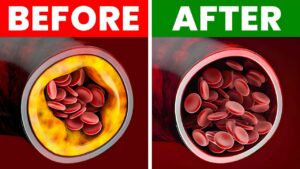This video discusses the benefits and proper consumption of apple cider vinegar. The speaker explains that apple cider vinegar improves insulin resistance, digestion, nutrient absorption, and can provide probiotic benefits. It is recommended for individuals with metabolic syndrome, insulin resistance, digestive complaints, and those wanting to support their overall health. The video suggests taking apple cider vinegar before or during meals and before bed for optimal benefits. Diluting it in water is advised to protect teeth and the esophagus. The speaker also discourages the use of antacids, as they neutralize stomach acid and can lead to various health issues.

Our Summaries are written by our own AI Infrastructure, to save you time on your Health Journey!
Key Insights:
- Apple cider vinegar improves insulin resistance, which helps manage diabetes and metabolic syndrome.
- Apple cider vinegar can improve digestion and nutrient absorption due to its acidity.
- Consuming high-quality apple cider vinegar with „the mother“ (sludge at the bottom of the bottle) can provide additional benefits for digestion and gut health.
- Probiotics present in raw and organic apple cider vinegar can help establish a healthier balance of gut flora.
- People with metabolic syndrome or digestive issues (such as GERD) can benefit from incorporating apple cider vinegar into their routine.
- Taking apple cider vinegar before or during meals can aid digestion and nutrient absorption.
- Consuming one to two tablespoons (15-30 milliliters) of apple cider vinegar diluted in water is recommended.
- Drinking apple cider vinegar as a condiment, in salad dressings, or as part of a lemonade-like drink can make it more enjoyable and easier to consume.
- Avoid taking antacids, as they neutralize stomach acid and hinder digestion and nutrient absorption.
Transcript
Hello health champions! So many people have asked questions about apple cider vinegar, so today we’re going to take a look at when and how to drink apple cider vinegar to get the maximum benefits. Coming right up!
Hey, I’m Dr. Ekberg. I’m a holistic doctor and a former Olympic decathlete. And if you want to truly master health by understanding how the body really works, make sure you subscribe and hit that notification bell so you don’t miss anything.
First of all, we want to take a look at the mechanism by which apple cider vinegar works because then the next two questions, who can benefit and when should you take it, will be pretty apparent.
Then we also want to talk about how to take apple cider vinegar to not have any side effects and to make it enjoyable. And finally, we’re going to throw in a little bonus to talk about acid that could possibly save or change your life or that of someone that you care about who may not have reached your level of understanding yet.
The first mechanism by which apple cider vinegar works is very well backed by science. There’s been a lot of research on this by now, and that is that it improves insulin resistance. Insulin resistance causes diabetes and metabolic syndrome, and with that comes issues with blood glucose, A1c, cholesterol, triglycerides, and belly fat. And there was a study that showed that for three months taking daily apple cider vinegar with the meals, then they reduced all of these markers significantly, whereas a control group who got a placebo had no significant changes. So that is remarkable in one study to reverse all of these markers while the placebo group had no change. And with that belly fat, they also changed. They improved the hip-to-waist ratio.
The second mechanism has not been researched a whole lot, but there is a tremendous amount of anecdotal evidence. Many thousands, tens, hundreds of thousands of people are reporting improved digestion when they take apple cider vinegar. Their digestion works better. And we have a lot of ideas that support the mechanism, the physiology. It makes sense that apple cider vinegar is acidic, and the research that they’ve done is on acetic acid. It’s not necessarily apple cider vinegar, but they know that acetic acid improves insulin resistance. So when we add acid to a system that is deficient in acid, then all sorts of things are going to start working better. And if you use a good quality apple cider vinegar, such as an organic, raw, apple cider vinegar, unfiltered, unpasteurized, with the mother, that’s the sludge at the bottom of the bottle, then you’re going to get some additional benefits for digestion. And with enough acidity, that helps digest protein. Mineral absorption depends on acidity. It needs an acidic environment to absorb minerals. It is also antimicrobial. So a lot of the pathogens, the viruses, and bacteria that you ingest, they get killed in an acidic environment. So that’s another layer of your immune system, of your defense barriers. Acid also stimulates the gallbladder to release bile for improved fat digestion, and it stimulates the pancreas to release pancreatic enzymes, digestive enzymes. So there are so many different mechanisms, so many different points of digestion that depend on acidity. And when we don’t make acid because we’re aging, etc., then all of these things are going to suffer. So by taking apple cider vinegar, you can help the body support. It’s not going to replace the hydrochloric acid completely, but it’ll give it a good boost. Another benefit that can help digestion is that there’s some probiotics. If you use a live, if you get a good quality apple cider vinegar with the mother and it’s unpasteurized and organic and so forth, then there’s going to be some bacteria that can compete with the pathogenic bacteria. So it acts like a probiotic, and it can help your body establish a better balance in your gut flora.
Now that we know how it works, the mechanism, now it’s pretty clear who can benefit. First of all, anyone with metabolic syndrome or anyone with insulin resistance, which is the majority of the modern world – type 2 diabetes, cholesterol, blood pressure, pre-diabetic. If you’re suffering from any of these or related to metabolic syndrome or even excess weight, then it’s kind of a no-brainer to take a little bit of apple cider vinegar because it’s so inexpensive. And we don’t want to think about it as a miracle thing. Don’t think it’s the only thing you have to do, but it can give you that little edge, that little boost, if you’re starting to eat better food, if you’re starting to eat less sugar and less processed carbohydrates and more fat and protein and real food. Then it definitely can give you an edge.
The other group of people is anyone who has any digestive complaints, especially people with GERD (gastroesophageal reflux disease) or heartburn. This is probably where people have the most anecdotal evidence. Thousands of people have had reflux, and when they take a little apple cider vinegar, then it goes away. And that’s confusing to a lot of people because when it burns, it feels like too much acid, but it’s actually caused by not enough acid. Because when you make enough acid, you digest the protein, and the food moves on to the rest of the digestive tract. But if you don’t have enough acid, then the food just kind of sits there forever, and it starts irritating. And then you have a lower level of acid for a really long time. That’s where the problem occurs. So by taking some more acid, then you’re actually improving the situation. And that’s where a lot of people have seen improvements. But even if you don’t know that you have a digestive problem, maybe you don’t have any symptoms, you can also benefit if you have a problem that’s secondary to digestion. And this could be just about anything. It could be hundreds of different things. For example, if you have certain amino acids, if you can’t make enough antibodies, if you can’t make proper immunoglobulins, that could be that you don’t have enough of those amino acids in your bloodstream because you can’t digest proteins properly. Or if you don’t have enough minerals, it could be because you’re not making enough acid to absorb them. So it could be a wide range of problems that are secondary to a digestive problem.
With all that in mind, I think it’s a no-brainer for anybody. I think it should be a regular regimen of life just to take a little bit, just in case, because it’s so cheap and can be so effective. The only people who want to avoid it, people who are not a good candidate, is someone with an ulcer. And you’ll know pretty quick because if you take some apple cider vinegar and it really burns, then you’re not a candidate. Figure out why you have an ulcer, do something about that, and then you could give it a try.
Now, it’s also pretty clear when you want to take it. There’s really two times that make sense: before or during a meal. Because we know it helps digestion and it helps nutrient absorption. So that’s why you’re eating in the first place, to absorb nutrients. And the other time is before bed. And the reason is that apple cider vinegar helps improve insulin sensitivity, improves the way insulin works. And there’s something called dawn effect, that means that you wake up with high blood sugar. And the reason is that there’s a hormone called cortisol that helps maintain blood sugar. And during the night when you’re not eating, cortisol gradually increases throughout the night. And a little bit before you wake up, your body has a little bit of an extra spike of cortisol and growth hormone to get you ready to start your day. In people with insulin resistance, that effect shows up a little bit stronger. Everyone has the dawn effect, everyone has that little boost of blood sugar in the morning. But if you’re insulin-resistant, then it shows up excessive. And if you take a little apple cider vinegar before bed, that has been shown to reduce that excess blood sugar from the dawn effect. Those would be two good times to take it. Other than that, there’s really not a bad time unless you notice that it’s burning or you feel some nausea or there’s something unpleasant about it. Then just figure out when it works best for you.
Now, how do you take it so that you don’t have to have an experience similar to this guy? Well, most of the research shows that you get most of the benefits or all of the benefits in some of the research from one tablespoon. That’s 15 milliliters. Other research used up to two tablespoons, but none of them really used any more than that. So I think that’s a safe range to stay within: one to two tablespoons, fifteen to thirty milliliters.
What we want to keep in mind, though, is that it’s not just the flavor that’s very strong, it is very acidic, and it’s acid enough that it corrodes the teeth and it irritates the esophagus. It’s kind of harsh in the mouth, and then it burns on the way down. And you want to avoid that because that’s not a good thing. Most or all of that goes away if you dilute it into a glass of water. So let’s say you’re taking one tablespoon a day and you’re taking three times a day, then all you need is one teaspoon, five milliliters, in a normal to large glass of water with each meal, and you’re set. If you don’t eat three meals, then you take a little bit more each time, and you’ll be fine. To make extra sure that you are careful with your teeth, you can use a straw, and you can rinse afterward. And to make sure you get all the benefits of the probiotics and the bacteria, then make sure you shake it up because that sludge in the bottom, the mother, that’s where that extra goodness from the bacteria is.
One way I like to take it is as a condiment. And I use it as a salad dressing and as a hot sauce. That way, you can get your apple cider vinegar as part of what you’re already eating. And in the salad dressing, I might use about 20% apple cider vinegar. And then if I use a couple of tablespoons, then I’ve gotten my dose of apple cider vinegar already just from the salad dressing. The hot sauce, the majority of it is apple cider vinegar. So you just need a couple of tablespoons on an omelette or on your wings or whatever you like to eat. And that way, you can get your apple cider vinegar that way.
I’ve also started taking it as a drink with the meal in the form of lemonade. And then all you need is one to two teaspoons of apple cider vinegar. I like to add one to two teaspoons of fresh lemon or lime juice – just squeeze the whole thing in and pop it in there. You sweeten it with stevia and add water, and now you have a very pleasant, really good-tasting lemonade that you drink with your meal, and you’re getting it all incorporated that way.
So what about antacids? That’s something that people take to reduce acid, to neutralize acid. So if you take something to neutralize an acid, is the body just stupid? Why does the body make acid in the first place? Well, like you’ve seen in this video, everything that we talked about – protein digestion, mineral absorption, gut health, insulin, fat, belly, metabolic syndrome – they are all helped, they all improve with acid. Now, if we truly understand that, if you understand how important that acid is, then and you take something to neutralize, to counteract that acid, then you also realize that you’re setting yourself up for some serious problems. So if virtually all of this is helped by acid, then that means that you’re gonna make all of that worse by taking an antacid. So if your body is reacting, if you feel like you have heartburn, figure out why that is – what are you eating, why isn’t your body working? Because taking an antacid is going to set you up for a long life of suffering. It’s going to create digestive issues. It’s gonna help create an unhealthy gut. It’s going to help create nutritional deficiencies because without acid, you can’t absorb the nutrients properly. In my opinion, antacids are one of the worst ideas ever, and I think they have created tons and tons of health problems. If you understand everything we’ve talked about in this video, I think that you’ll agree.
If you enjoyed this video, I think you’ll love that one. Thank you so much for watching. I’ll see you in the next video.





